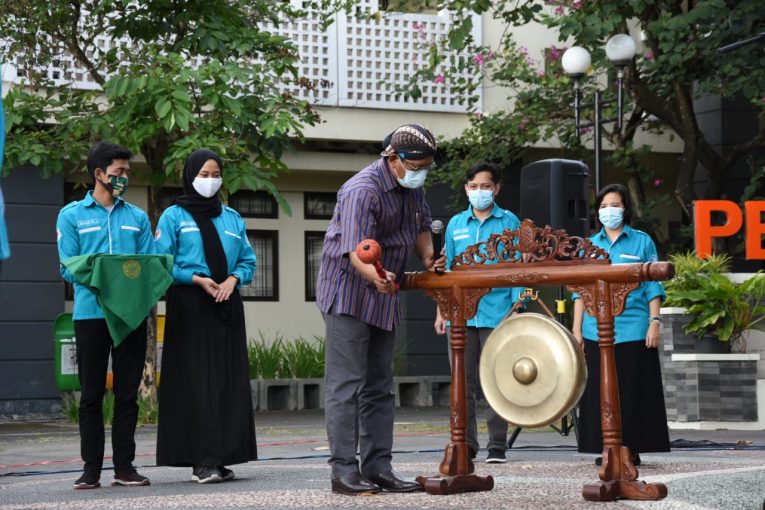
The livestock industry will be one of the important pillars in the future in terms of economy. This is because the need for animal protein in the form of meat, eggs and milk will be very much needed, especially for people whose income and education are increasing. The increasing need for food must be accompanied by the preparation and improvement of the quality of human resources, one of which is through higher education in animal science.
This was said by the Dean of the Faculty of Animal Science (FAS) UGM when welcoming new students online on Friday (11/9). This year, Faculty of Animal Science UGM has accepted 300 new students. The responsibility to educate the nation’s life in the field of livestock makes the Faculty of Animal Science UGM an inclusive campus, where the Faculty of Animal Science UGM also accepts students with special needs.
“Among these students, there are those who have graduated to become bachelors. This is part of the noble mission of educating the nation,” said Ali.
The Dean added that the new students were candidates for high quality human resources produced by the Faculty of Animal Science UGM who would become a small part of the youth elite in Indonesia. This generation will enter the industrial world 4.0 which does not only rely on skills and soft skills. Apart from English, there are other competencies that must be honed and processed, namely the ability to use information, communication and technology (ICT). This will determine whether someone is able to compete in an increasingly competitive arena of global competition.
“Faculty of Animal Science UGM produces graduates who are needed in the industrial world because they not only provide practical knowledge of livestock but also soft skills, namely leadership, entrepreneurship, and ethics,” said Ali.
According to Ali, achieving success does not only require sharpening the mind but also conscience, character and integrity. In addition, it is important to keep the body healthy so that in each student there is a smart brain, a good heart, skilled hands, and a healthy body.
FAS UGM has reliable lecturers. Of the 73 lecturers, 90% have doctoral degrees and 30% have professors’ titles. In addition, the Faculty of Animal Science UGM is equipped with various facilities, for example the Technical Implementation Unit (UPT) which oversees units in the form of dairy livestock, grass gardens, beef cattle, horses, closed houses, milk processing, animal feed fabrication, and small-scale animal slaughtering house.
“Outside the FAS UGM, there are facilities and infrastructure in Berbah that can be used for education and research, namely closed house with a capacity of 60,000 broilers, 40 dairy cows, 30 beef cattle, grass gardens, and chicken slaughtering house in collaboration with industries with slaughtering capacities. reaching 30,000 head per day,” Ali said.
Chairman of the Alumni Family of the FAS UGM (Kapgama), Ir. Achmad Dawami, who also gave presentation to new students, said that livestock knowledge will be increasingly needed as the world gets older.
“In Law number 18 of 2012 concerning food, it is stated that the state is obliged to realize the availability, affordability, fulfillment of sufficient food consumption for the community. The food referred to in this case is food that is safe, high quality, and nutritious,”said Dawami.
This means that the role of livestock in Indonesia is extraordinary. This role is supported by the achievements or strengths of human resources that will bring developed countries.
Dawami said, up to 2018, the world of livestock has absorbed 13-14 million domestic workers / livestock households in Indonesia. This shows that the livestock sector can provide employment for people, especially in rural areas.
“The Covid-19 pandemic has caused extraordinary changes that should have been anticipated. In the business world, demand has dropped dramatically, even government revenues have also fallen. This happened because household consumption, which is the largest consumption, fell by more than 50%,” Dawami said.
The task of Fapet UGM graduates is very noble because in the next 17-20 years the population will reach 9 billion who will fight for water, food, and energy. Therefore, it is hoped that students seek the best possible knowledge in order to create efficiency in terms of food.
Dawami hopes that students can follow these changes well, especially since the field of livestock is a food provider in Indonesia which is expected not to depend solely on imports. In the future, everything in livestock will be different because of automation.
“Even so, in trouble during a pandemic there is definitely a chance. For that, Dawami hopes that the students will be smart in seeing the opportunities that exist. By using different technology, systems, production and marketing, it is hoped that students will play a role in food availability in Indonesia,” he concluded.
